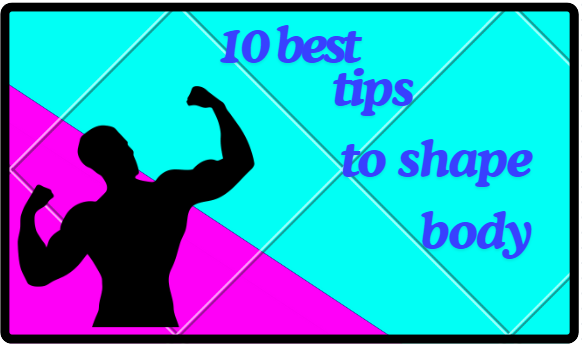Best Ways to Shape Your Body as a Beginner
Embarking on a fitness journey as a beginner can be both exciting and challenging. The key to shaping your body effectively lies in a balanced approach that combines proper exercise, nutrition, and lifestyle habits. Here’s a comprehensive guide to help you get started on the right track.
1. Set Realistic Goals
Importance of Goal Setting
Setting realistic and achievable goals provides direction and motivation. Whether your aim is to lose weight, build muscle, or improve overall fitness, having clear objectives helps you stay focused and track progress.
How to Set Goals
- Specific: Define clear and specific goals (e.g., “lose 10 pounds in three months”).
- Measurable: Ensure your goals can be measured (e.g., track weight, body measurements).
- Achievable: Set attainable goals based on your current fitness level.
- Relevant: Align your goals with your personal fitness aspirations.
- Time-bound: Set a deadline to achieve your goals.
2. Create a Balanced Workout Routine
Components of a Balanced Routine
A balanced workout routine should include a mix of cardiovascular exercise, strength training, and flexibility work. This combination ensures comprehensive fitness and prevents imbalances.
Sample Beginner Routine
- Cardio: Aim for at least 150 minutes of moderate-intensity cardio per week (e.g., brisk walking, cycling, or swimming).
- Strength Training: Perform strength training exercises at least two days a week, targeting all major muscle groups.
- Flexibility: Incorporate stretching or yoga sessions to improve flexibility and reduce the risk of injury.
3. Learn Proper Exercise Form
Importance of Proper Form
Using correct form during exercises minimizes the risk of injury and maximizes effectiveness. Improper technique can lead to strains, sprains, and other injuries that can hinder progress.
Tips for Maintaining Form
- Start with Bodyweight Exercises: Master bodyweight exercises before progressing to weights.
- Watch Tutorials: Use online tutorials and videos to learn the proper technique.
- Consider Professional Guidance: Hiring a personal trainer can provide personalized instruction and feedback.
4. Incorporate Compound Movements
Benefits of Compound Exercises
Compound exercises engage multiple muscle groups simultaneously, promoting efficient calorie burning and muscle building. These movements are essential for overall strength and functional fitness.
Effective Compound Exercises
- Squats: Target the legs, glutes, and core.
- Deadlifts: Work the back, glutes, and hamstrings.
- Push-ups: Engage the chest, shoulders, and triceps.
- Pull-ups: Strengthen the back and biceps.
5. Focus on Nutrition
The Role of Nutrition
Proper nutrition is crucial for fueling your workouts, promoting recovery, and achieving your fitness goals. A balanced diet provides the necessary nutrients to support muscle growth, fat loss, and overall health.
Nutrition Tips
- Eat Whole Foods: Prioritize whole, unprocessed foods like fruits, vegetables, lean proteins, and whole grains.
- Stay Hydrated: Drink plenty of water throughout the day to stay hydrated.
- Balanced Macronutrients: Ensure your diet includes a good balance of carbohydrates, proteins, and fats.
- Meal Timing: Eat regular meals and snacks to maintain energy levels.
6. Prioritize Recovery
Importance of Recovery
Recovery is essential for muscle repair, growth, and preventing overtraining. Neglecting recovery can lead to burnout and injury.
Recovery Strategies
- Rest Days: Include at least one or two rest days per week.
- Sleep: Aim for 7-9 hours of quality sleep each night.
- Stretching and Foam Rolling: Incorporate stretching and foam rolling to improve flexibility and reduce muscle soreness.
- Active Recovery: Engage in light activities like walking or yoga on rest days.
7. Stay Consistent
Consistency is Key
Consistency is the most important factor in achieving and maintaining fitness goals. Regular exercise and healthy habits will yield the best results over time.
Tips for Staying Consistent
- Create a Schedule: Plan your workouts and stick to a regular routine.
- Find Activities You Enjoy: Choose exercises and activities that you enjoy to make it easier to stay committed.
- Track Your Progress: Keep a fitness journal to monitor improvements and stay motivated.
8. Listen to Your Body
Understanding Your Body’s Signals
Listening to your body is crucial to avoid overtraining and injury. Pay attention to how your body responds to different exercises and adjust accordingly.
Tips for Listening to Your Body
- Rest When Needed: Don’t push through pain or excessive fatigue.
- Modify Exercises: Adapt exercises if they cause discomfort or strain.
- Stay Flexible: Be willing to adjust your routine based on how you feel each day.
9. Stay Motivated
Keeping Motivation High
Maintaining motivation can be challenging, especially when progress slows. Finding ways to stay inspired can help you stay on track.
Motivation Strategies
- Set Short-term Goals: Break down long-term goals into smaller, achievable milestones.
- Reward Yourself: Celebrate your achievements with non-food rewards.
- Find a Workout Buddy: Exercise with a friend to stay accountable and make workouts more enjoyable.
- Mix It Up: Vary your routine to keep things interesting and prevent boredom.
10. Educate Yourself
Importance of Continuous Learning
Educating yourself about fitness, nutrition, and overall health empowers you to make informed decisions and adapt your routine as needed.
Learning Resources
- Books and Articles: Read books and articles from reputable sources.
- Online Courses: Enroll in online fitness courses to deepen your knowledge.
- Fitness Apps: Use fitness apps that provide guidance, tracking, and educational content.
Frequently Asked Questions (FAQs)
1. How often should a beginner exercise?
As a beginner, aim to exercise at least 3-4 times per week. This can include a mix of cardio, strength training, and flexibility exercises. Gradually increase the frequency as your fitness level improves.
2. How long does it take to see results?
Results vary depending on individual factors such as starting point, consistency, and intensity. Generally, noticeable changes can be seen within 4-6 weeks of regular exercise and proper nutrition.
3. Do I need to follow a strict diet to shape my body?
While a strict diet is not necessary, maintaining a balanced and healthy diet is crucial for achieving fitness goals. Focus on whole foods, proper portion sizes, and staying hydrated.
4. Can I shape my body without going to the gym?
Yes, you can shape your body without a gym. Bodyweight exercises, home workout equipment, and outdoor activities can effectively improve fitness and shape your body.
5. How important is sleep for fitness?
Sleep is vital for muscle recovery, growth, and overall well-being. Aim for 7-9 hours of quality sleep per night to support your fitness goals and enhance performance.
Starting your fitness journey as a beginner is a commendable step towards a healthier lifestyle. By following these tips and staying committed to your goals, you’ll be well on your way to shaping your body and improving your overall fitness. Remember, patience and consistency are key to long-term success.

